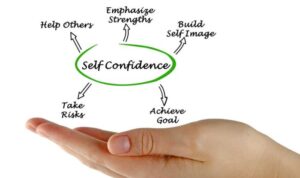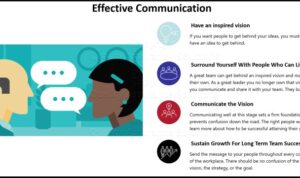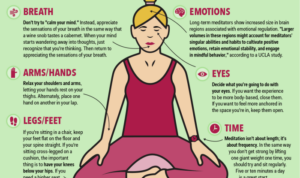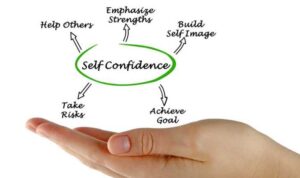Building Self-Confidence is all about owning your power and embracing your uniqueness, paving the way for success in every aspect of your life. Get ready to dive into the journey of self-discovery and empowerment.
Let’s explore the keys to unlocking your confidence and creating a positive mindset that sets the stage for growth and fulfillment.
Understanding Self-Confidence
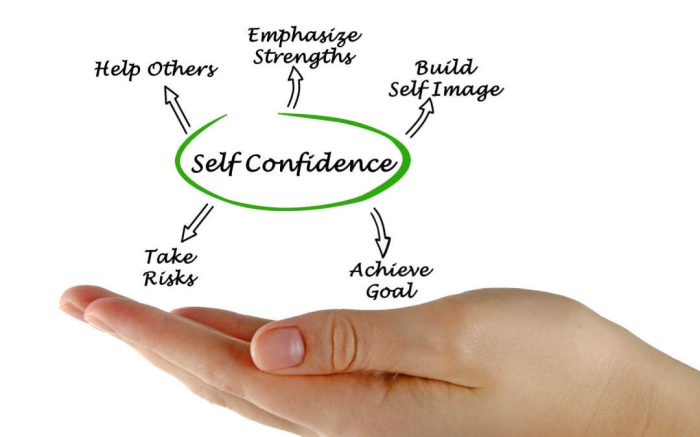
Self-confidence is the belief in oneself and one’s abilities. It plays a crucial role in personal development as it empowers individuals to take risks, face challenges, and pursue their goals with determination. Without self-confidence, individuals may doubt their abilities, struggle with decision-making, and feel insecure in various aspects of life.
Impact on Relationships, Work Performance, and Mental Well-being
- Relationships: Self-confident individuals are more likely to communicate effectively, set boundaries, and maintain healthy relationships. They are assertive, respectful, and able to express their needs without fear of rejection.
- Work Performance: Confidence at work can lead to increased productivity, better problem-solving skills, and a willingness to take on new responsibilities. It also enhances leadership qualities and the ability to work well in a team.
- Mental Well-being: Self-confidence is closely linked to mental well-being as it reduces stress, anxiety, and feelings of inadequacy. It promotes a positive self-image and a sense of self-worth, contributing to overall happiness and fulfillment.
Behaviors and Traits Demonstrating High Self-Confidence
- Standing up for oneself without being aggressive
- Handling criticism constructively
- Taking risks and embracing challenges
- Accepting failures as opportunities for growth
- Setting and achieving personal goals
Common Misconceptions About Self-Confidence
- “Self-confident people are arrogant”: Confidence is about belief in oneself, not superiority over others. True confidence is humble and respectful.
- “Confidence is fixed”: Confidence can be developed and strengthened through practice, self-awareness, and positive reinforcement.
- “Confident people never feel insecure”: Everyone experiences moments of doubt or insecurity, even the most self-confident individuals. It’s about how they manage and overcome those feelings.
Building Self-Confidence

Building self-confidence is crucial in various aspects of life, from personal relationships to professional success. It involves believing in your abilities, worth, and potential to achieve your goals.
Strategies for Building Self-Confidence
- Set realistic goals: Break down big goals into smaller, achievable steps to build confidence incrementally.
- Practice self-care: Prioritize your physical and mental well-being by getting enough rest, exercise, and engaging in activities that bring you joy.
- Acknowledge your strengths: Focus on what you do well and celebrate your accomplishments, no matter how small they may seem.
- Challenge negative self-talk: Replace self-doubt with positive affirmations and constructive thoughts to reframe your mindset.
Tips for Overcoming Self-Doubt
- Avoid comparing yourself to others: Everyone has their unique journey and strengths, so focus on your progress instead of comparing yourself to others.
- Seek support: Surround yourself with positive and encouraging individuals who believe in you and lift you up when self-doubt creeps in.
- Practice self-compassion: Treat yourself with kindness and understanding, just as you would a close friend facing a challenge.
The Role of Self-Care in Nurturing Self-Confidence
- Self-care involves taking care of your physical, emotional, and mental well-being to feel confident and empowered.
- Engage in activities that bring you joy and relaxation, such as hobbies, exercise, or spending time with loved ones.
- Prioritize self-care habits like getting enough sleep, eating nourishing foods, and practicing mindfulness to boost your overall confidence.
Techniques for Setting Achievable Goals
- Follow the SMART criteria: Make sure your goals are Specific, Measurable, Achievable, Relevant, and Time-bound to set yourself up for success.
- Break down big goals into smaller milestones to track your progress and celebrate each achievement along the way.
- Visualize your success: Imagine yourself achieving your goals and how it would feel, which can motivate you to take action and build confidence.
Cultivating a Positive Mindset: Building Self-Confidence
Having a positive mindset is crucial for building self-confidence as it shapes how we perceive ourselves and the world around us.
Impact of Negative Self-Talk on Self-Confidence
Negative self-talk can significantly impact self-confidence by reinforcing limiting beliefs and undermining our abilities. It creates a cycle of doubt and fear, making it harder to believe in ourselves.
- Acknowledge negative thoughts: Recognize when negative self-talk is occurring and challenge these thoughts by reframing them in a more positive light.
- Practice self-compassion: Treat yourself with kindness and understanding, just as you would a friend facing a similar situation.
- Affirmations: Use positive affirmations to counteract negative self-talk and build a more positive self-image.
- Seek support: Surround yourself with positive influences and seek help from a therapist or counselor if negative self-talk becomes overwhelming.
Benefits of Gratitude and Self-Compassion, Building Self-Confidence
Cultivating gratitude and self-compassion can greatly enhance self-confidence by fostering a more positive and accepting view of oneself.
- Gratitude journal: Take time each day to write down things you are grateful for, focusing on the positive aspects of your life.
- Self-care practices: Engage in activities that promote self-compassion, such as meditation, mindfulness, or self-care routines.
- Reflect on achievements: Celebrate your successes and acknowledge your strengths, boosting self-confidence and self-worth.
- Practice forgiveness: Let go of past mistakes and forgive yourself, allowing room for growth and self-acceptance.
Facing Challenges and Failures
Facing challenges is a crucial aspect of building self-confidence. When we encounter difficult situations and overcome them, it reinforces our belief in our abilities and strengths. This, in turn, boosts our self-confidence and resilience.
The Role of Resilience
Resilience plays a vital role in overcoming failures and setbacks. It is the ability to bounce back from adversity, learn from mistakes, and keep moving forward. When we develop resilience, we become better equipped to handle challenges and failures, ultimately strengthening our self-confidence.
- Resilience helps us view failures as temporary setbacks rather than permanent defeats.
- It enables us to adapt to change and persevere in the face of obstacles.
- Resilience empowers us to maintain a positive mindset during tough times.
Examples of Famous Personalities
Many successful individuals have experienced significant failures that ultimately led to their growth and increased self-confidence. Some examples include:
- Walt Disney, who faced multiple rejections before creating the iconic Disney brand.
- Oprah Winfrey, who overcame a challenging upbringing to become a media mogul and philanthropist.
- J.K. Rowling, who turned her struggles into inspiration for the beloved Harry Potter series.
Reframing Failures as Learning Experiences
To boost self-confidence, it’s essential to reframe failures as opportunities for growth and learning. By shifting our perspective on setbacks, we can extract valuable lessons and insights that can propel us forward.
- Reflect on what went wrong and identify areas for improvement.
- Focus on the lessons learned rather than dwelling on the failure itself.
- Use setbacks as motivation to work harder and smarter towards achieving your goals.







